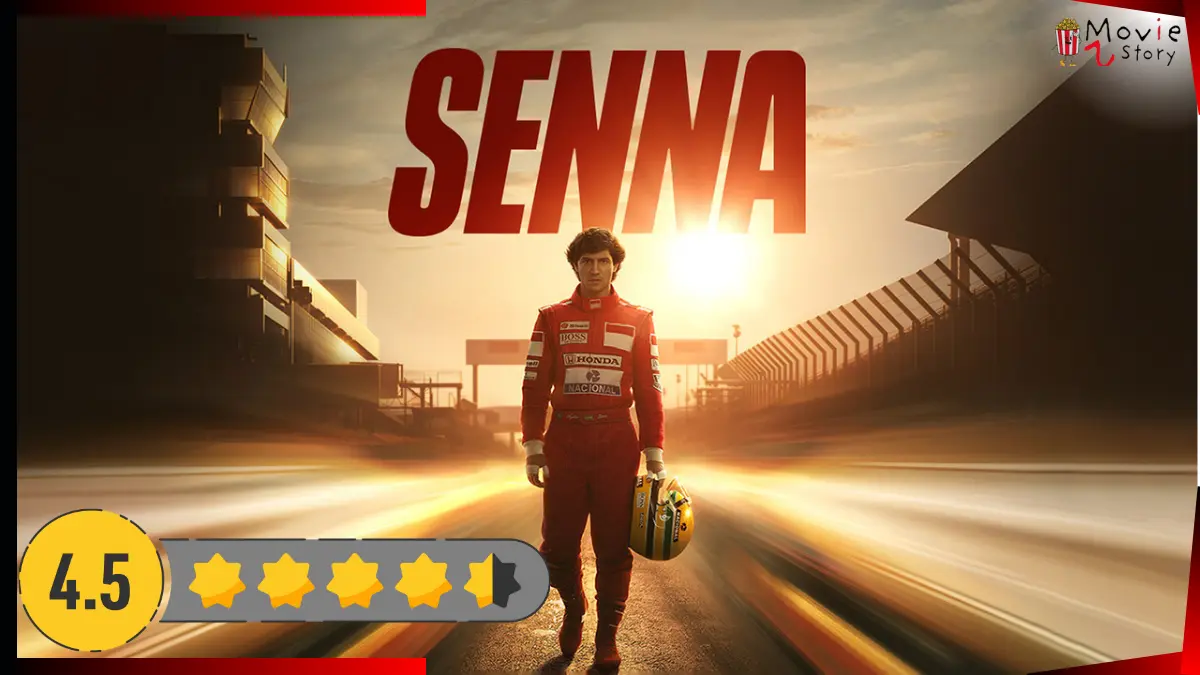Senna movie review: Netflix’s six-part series Senna ambitiously seeks to dramatize the life of Ayrton Senna, a Formula 1 legend whose career and untimely death in 1994 left an indelible mark on motorsport history. This scripted series, released over 30 years after his passing, attempts to combine dramatic storytelling with historically significant racing moments, aiming to both honor Senna’s legacy and provide insight into his personal life. While the series succeeds in recreating key elements of his career and persona, it faces challenges in balancing emotional depth with the need to entertain.
Senna movie review
The series begins by exploring Senna’s early life in São Paulo, Brazil, portraying his formative years with his family and his deep connection to motorsport. His relationship with his father, Milton da Silva, is highlighted as a crucial influence in his career. This foundation sets the stage for Senna’s journey through the karting world and into the competitive ranks of Formula Ford and Formula 3.
These early chapters capture the essence of Senna’s determination and skill, depicting him as a fiercely competitive individual driven by an unwavering passion for racing. Gabriel Leone’s portrayal of Senna effectively captures his charisma and intensity, but the narrative occasionally glosses over the more nuanced aspects of his character, such as his introspective nature and spiritual beliefs.
One of the standout aspects of Senna is its meticulous attention to detail in recreating iconic racing moments. The series makes an earnest effort to replicate the cars, tracks, and aesthetics of the 1980s and 1990s racing era. From Senna’s breakthrough performance at the 1984 Monaco Grand Prix to his legendary rivalry with Alain Prost, these sequences are visually impressive and highlight the stakes of Formula 1 at the time.
However, the special effects, while commendable, fall short of the cinematic standards set by films like Rush and Ford v Ferrari. The integration of archival footage with modern recreations is a mixed success; while it provides historical grounding, the disparity in visual quality can be distracting, breaking the immersion during critical moments.
The series also attempts to delve into Senna’s personal relationships, including his romances and interactions with family, team members, and rivals. While these subplots provide a glimpse into his private life, they often feel underdeveloped due to the limited screen time allocated to each. Many characters are introduced with documentary-style captions, which, though informative, disrupt the flow of the narrative. This approach makes it challenging for viewers to form emotional connections with these figures, reducing the impact of Senna’s interpersonal dynamics.
The depiction of his rivalry with Alain Prost, for instance, leans heavily into dramatization, portraying Prost as an almost cartoonish antagonist who lacks the depth of a genuine rival. This simplistic characterization undermines the complexity of their relationship, which was as much about mutual respect and philosophical differences as it was about competition.
Despite its focus on Senna’s personal life, the series frequently returns to the racetrack, using dramatic recreations of pivotal events to drive the narrative. Iconic incidents, such as Senna’s infamous collisions with Prost and his battles with the FIA, are faithfully reconstructed, adding a layer of authenticity to the drama. However, some creative liberties taken by the series, such as a karaoke scene where Senna and McLaren boss Ron Dennis negotiate with Honda, come across as contrived. These moments, while designed to add tension, detract from the overall realism of the series and may disappoint motorsport purists.
A significant drawback of Senna is its tendency to simplify historical events and relationships for the sake of storytelling. Jean-Marie Balestre, the former president of FISA (now FIA), is portrayed as a stereotypical villain intent on undermining Senna’s career. While Balestre’s controversial decisions and favoritism toward Prost are well-documented, the series fails to explore the broader political context of Formula 1 during that era. This one-dimensional portrayal reduces the complexity of Senna’s struggles within the sport and misses an opportunity to provide a more nuanced understanding of the challenges he faced.
When compared to Asif Kapadia’s 2010 documentary, Senna, the Netflix series falls short in terms of emotional resonance and depth. Kapadia’s film relied on real footage and interviews to create an intimate portrait of Senna, capturing his fears, faith, and vulnerabilities alongside his triumphs. The documentary’s raw and unfiltered approach made it a powerful and enduring tribute to Senna’s life. In contrast, the dramatized series, while visually polished, often feels like a surface-level retelling that prioritizes spectacle over substance. Key moments, such as Senna’s tragic accident at Imola in 1994, are treated with brevity, leaving little room for the emotional weight they deserve.
Nevertheless, Senna succeeds in reaffirming Ayrton Senna’s enduring legacy as one of the greatest drivers in Formula 1 history. The series captures his passion for racing, his unwavering commitment to his craft, and his deep connection to his Brazilian heritage. For viewers unfamiliar with his story, it serves as an engaging introduction, while longtime fans may appreciate the effort to recreate his most iconic moments. However, its reliance on dramatization and lack of depth may leave some wishing for a more authentic portrayal.
Summary
In summary, Netflix’s Senna is a visually ambitious and emotionally earnest tribute to a motorsport icon. While it offers an entertaining overview of Ayrton Senna’s life and career, it ultimately struggles to match the emotional impact and authenticity of the 2010 documentary. For those curious about Senna’s legacy, the series provides a compelling starting point, but it remains overshadowed by the raw power of the original documentary that first captured the heart and soul of a legend.
Top Rotten Tomatoes Reviews
Kapadia has crafted an intimate character study of the man that puts almost as much emphasis on his spirituality, his doubts and his relationship with his country as it does on his ability to drive a fast car – Wendy Ide, Times (UK)
This is not just a good film – it’s a great film: fascinating, exciting, nerve-wracking and profoundly moving – Deborah Ross, The Spectator
A psychologically intriguing if at times too hagiographic portrait of a man who often held pole position in his profession and felt nearer to God because of it – Lisa Kennedy, Denver Post
You don’t have to know anything about car racing at all. Instead, you simply have to like a great story, one that has all the elements: drama, inspiration, competition, victory, defeat, betrayal and, looming above it all, tragedy – Bill Goodykoontz, Arizona Republic
It’s stripped of narration, talking heads, and anything else that might threaten to slow it down – Anthony Lane, The New Yorker
Top Movie Ratings
| Metacritic | 79% |
| Rotten Tomatoes | 93% |
| Imdb | 8.5/10 |
Latest Release Movie:

